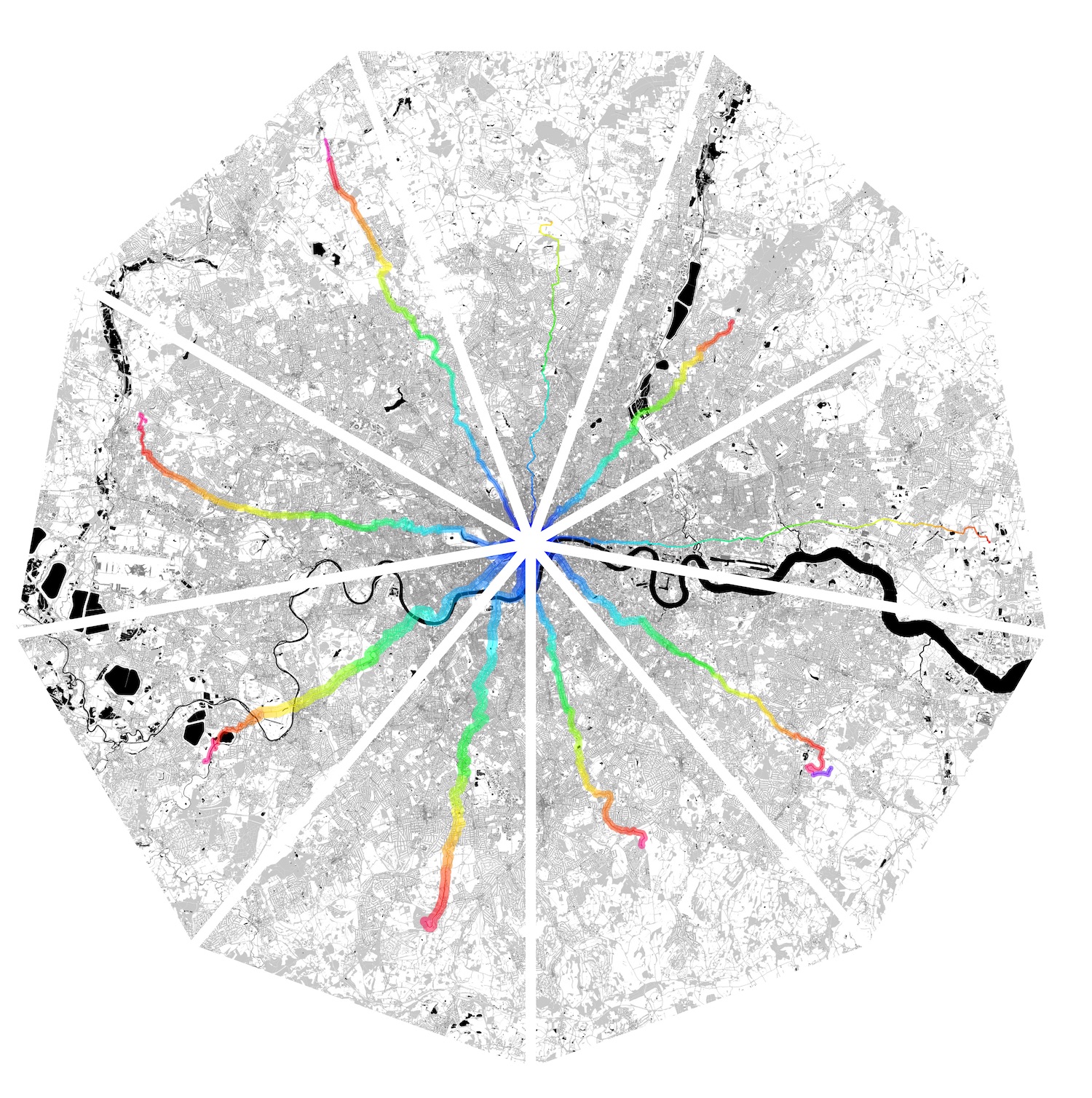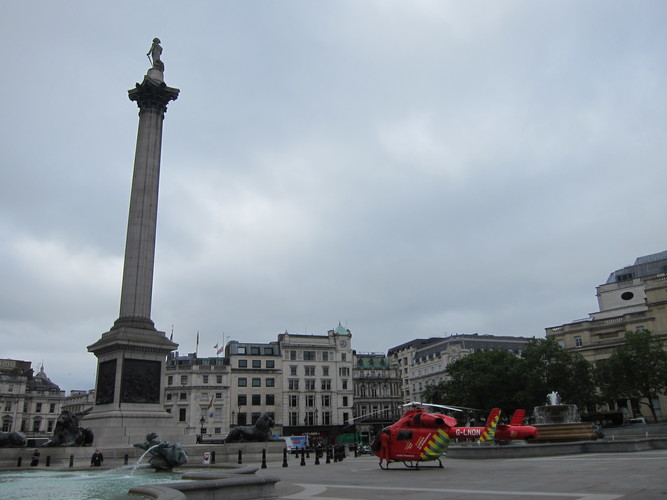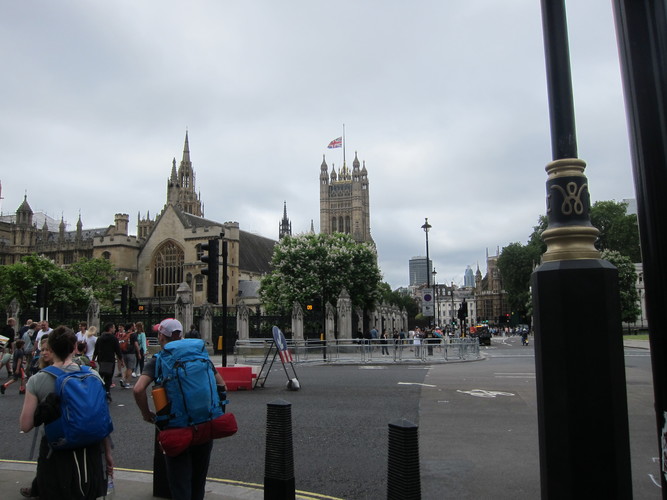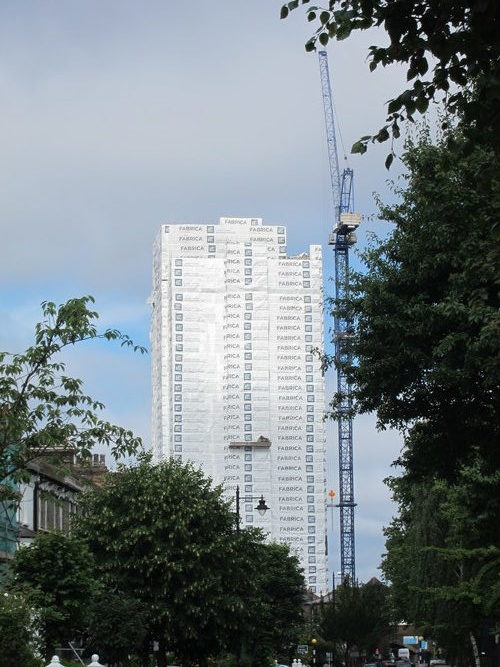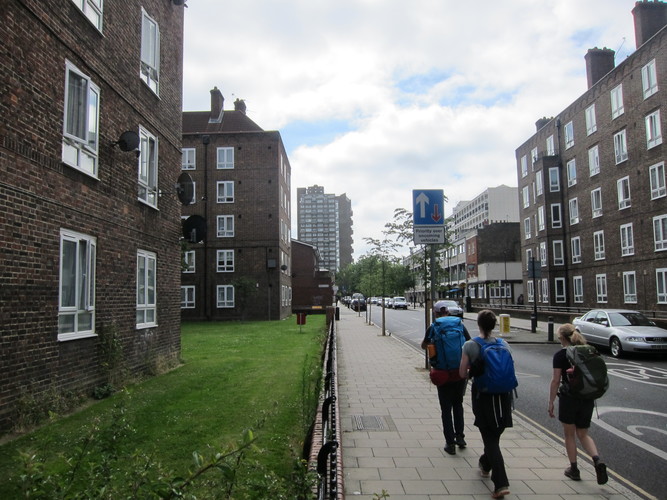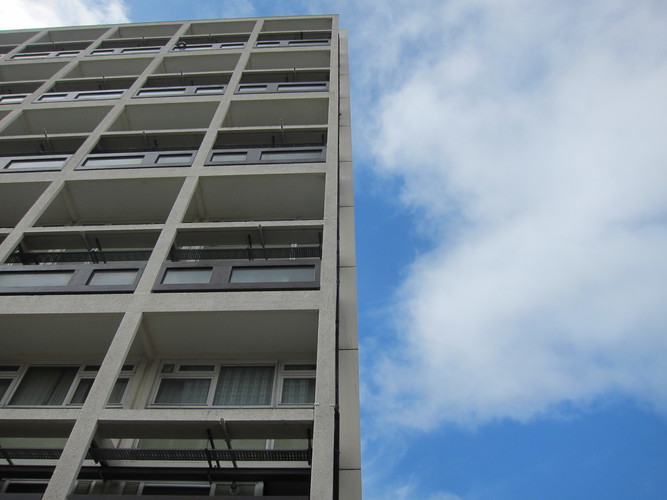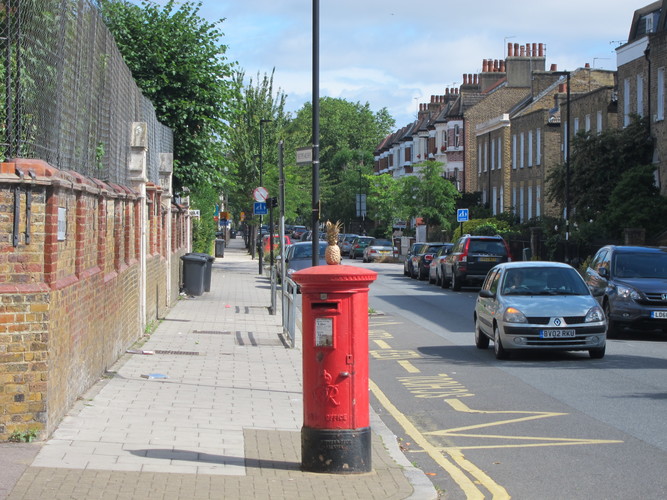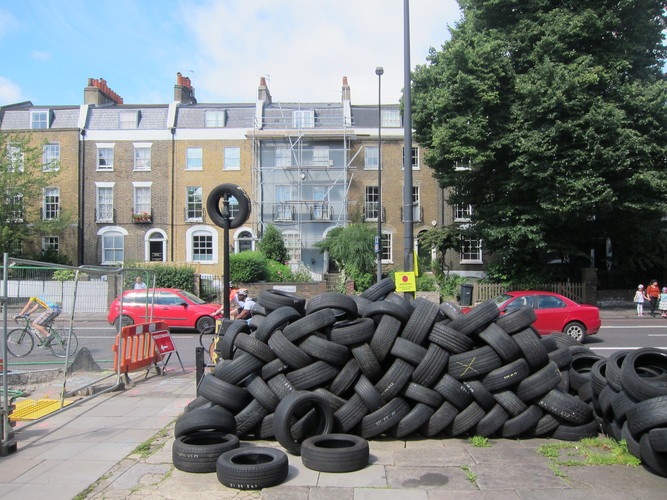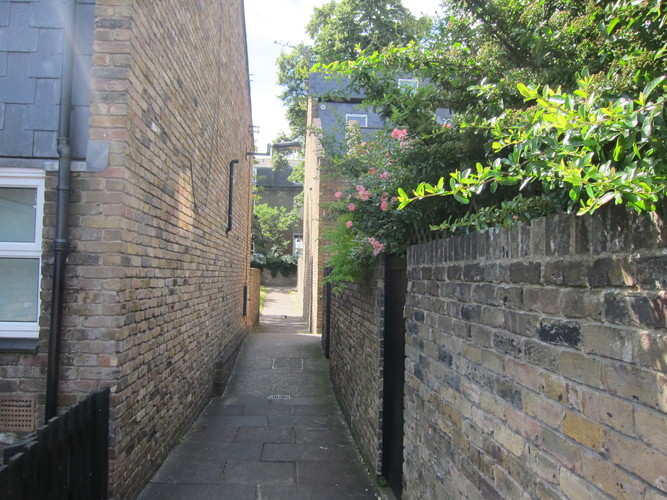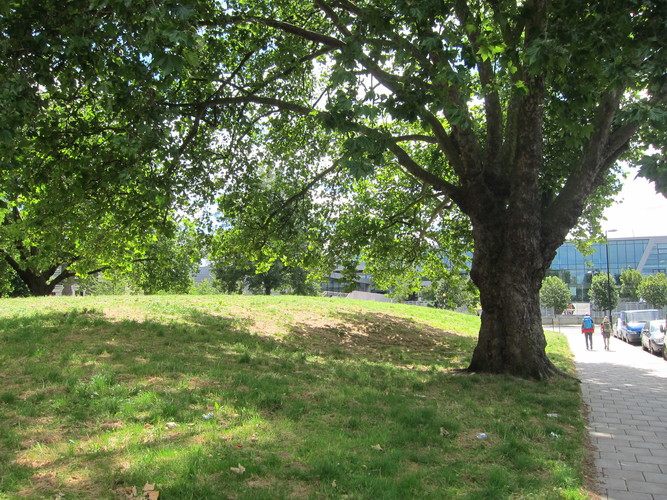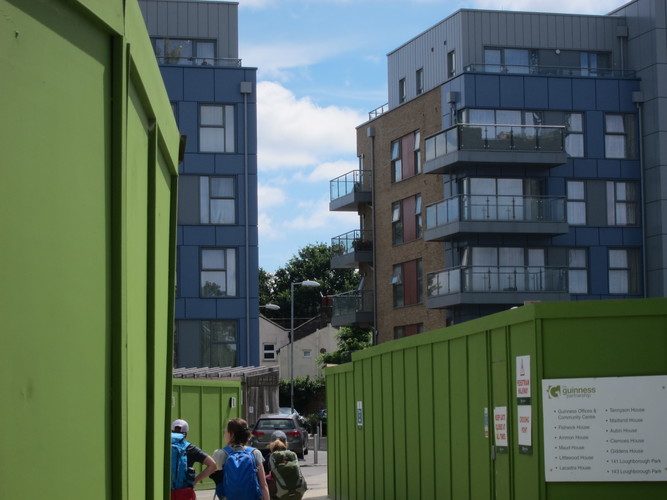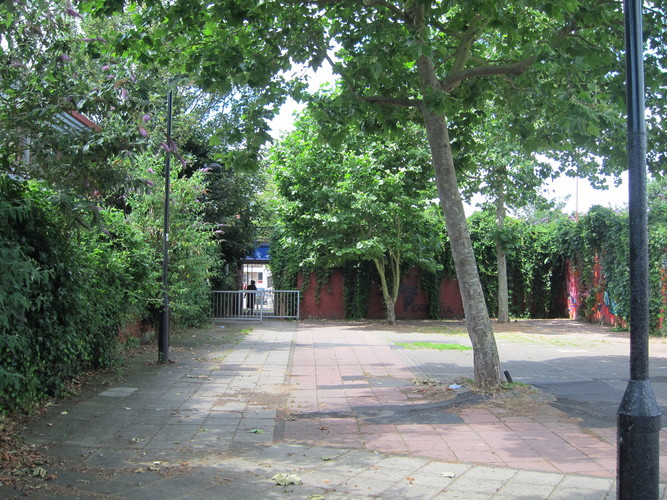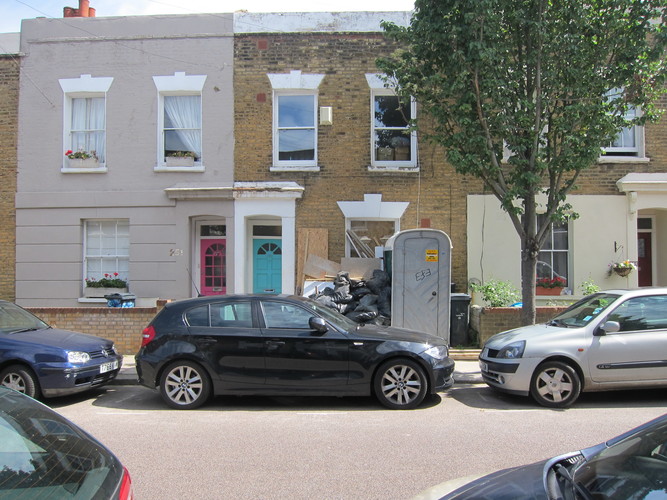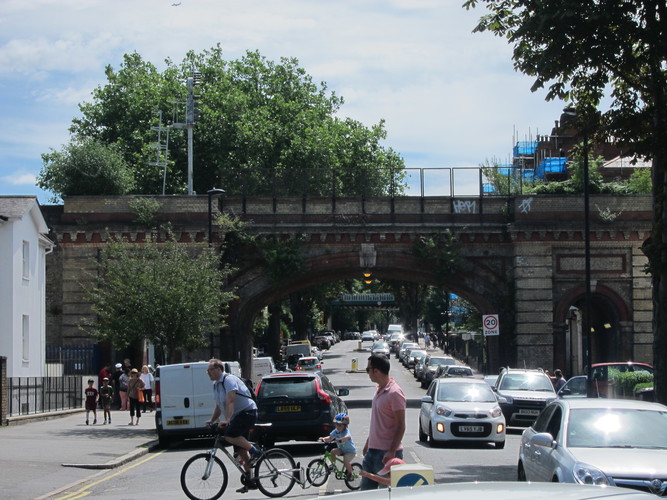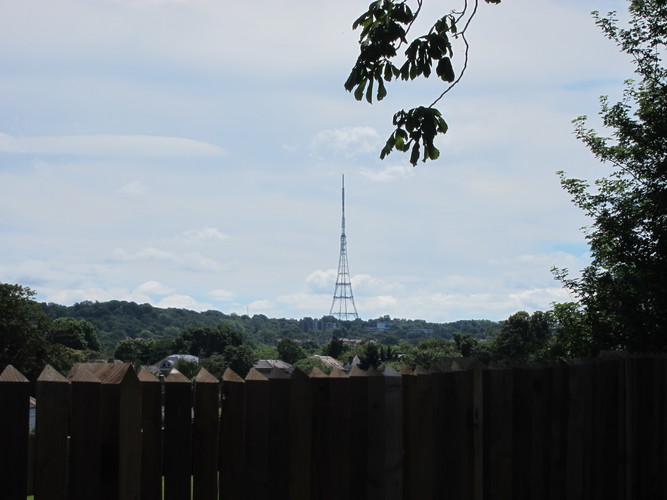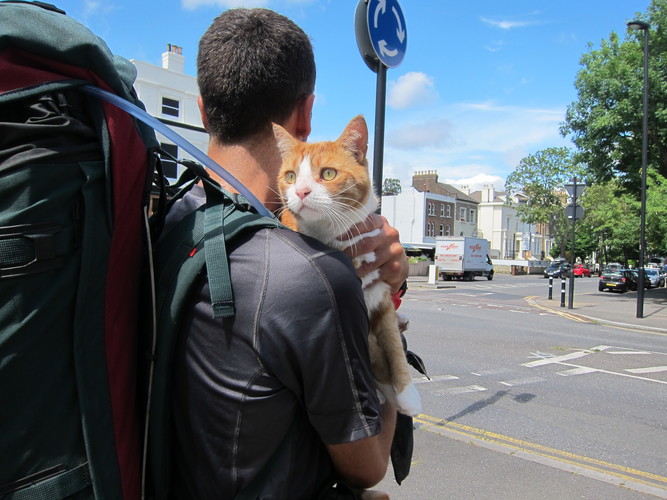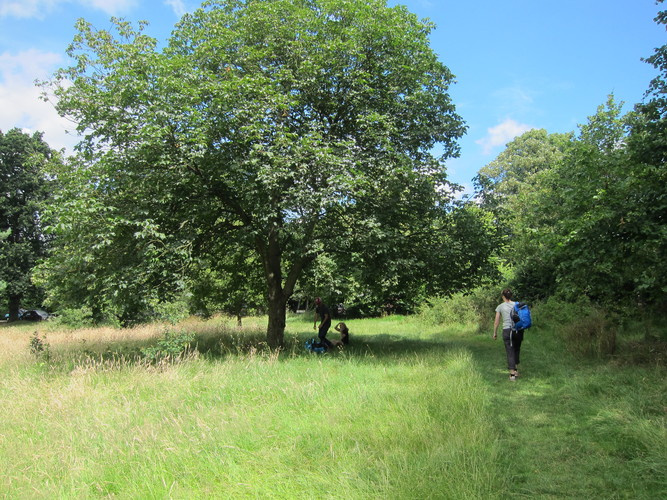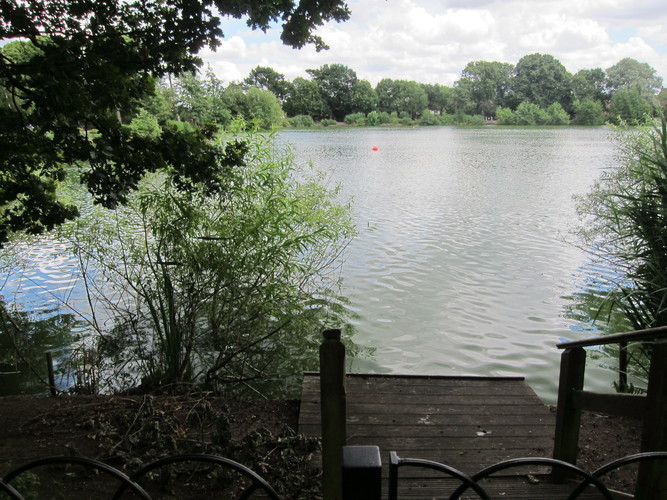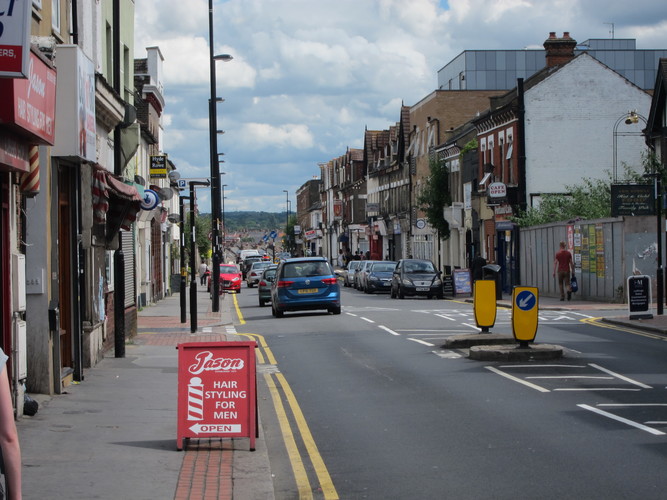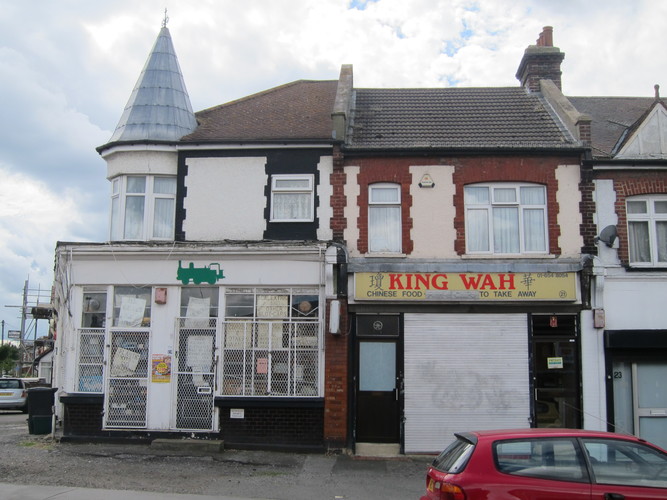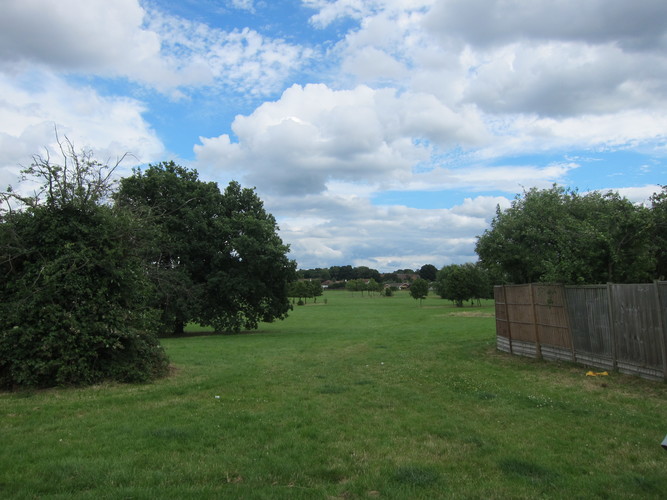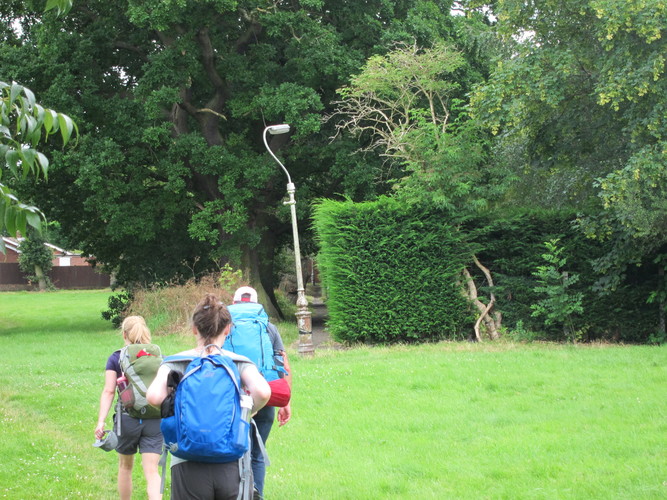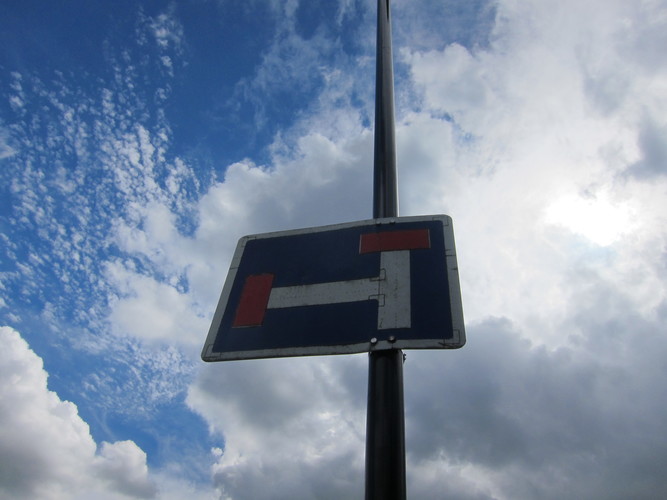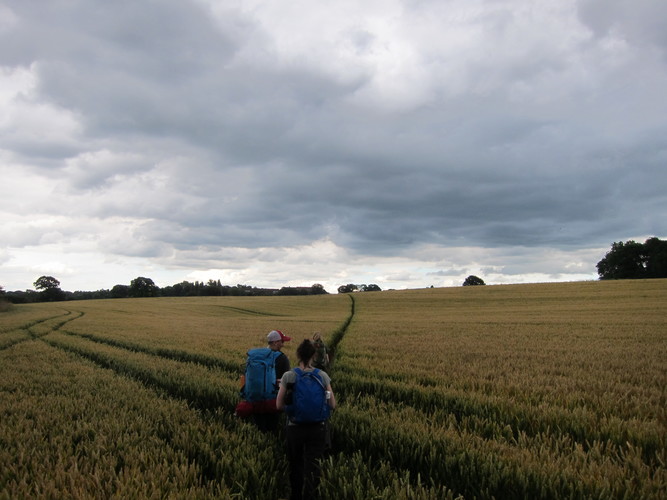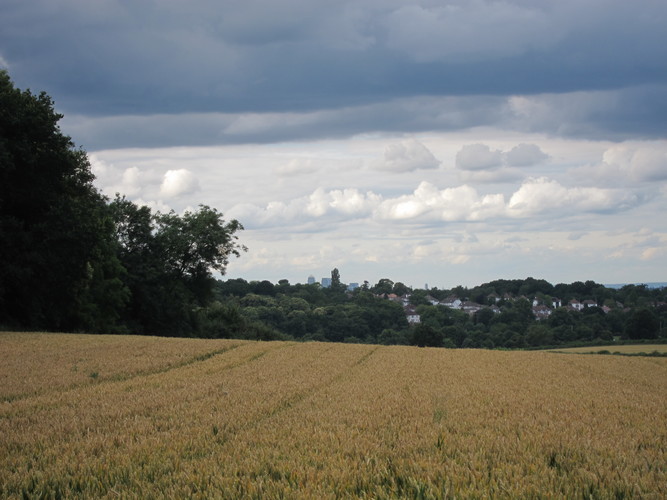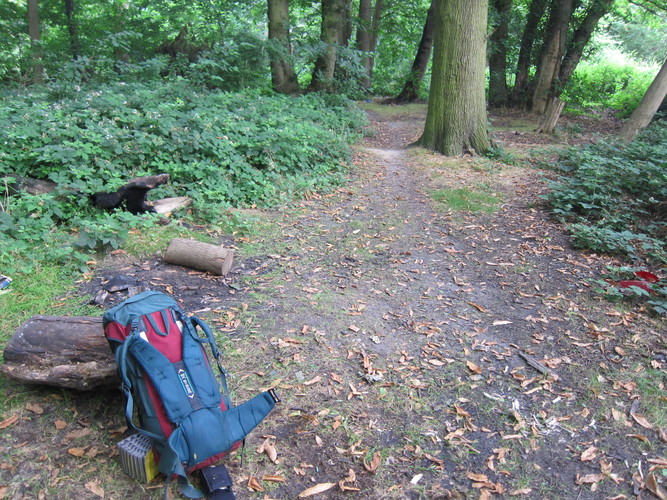It was overcast, but not raining. I walked through the park to catch the tube. I was feeling hot, a little vulnerable, but on balance ok, and I was looking forward to a weekend adventure. To drop beneath the surface of society, to become invisible, gone from the network of communications, transport, and money. Walking through the physical terrain of society, but not interacting with it.
I bought a coffee and two pastries at the shop near the tube station. In the train I sat on my backpack at the head of the carriage, looking down the aisle, reading an essay on gifts, drinking coffee.
I met Sarah at Covent Garden and we walked to Charing Cross. As we approached, a red helicopter came in low, landing near Trafalgar Square. Then, sirens, ambulances, converging on a small square set back from the road. Police and paramedics gathered around a focal point, although we couldn’t see what they gathered around. As we walked on, more paramedics ran in, with a slow-motion trotting gait, with police carrying automatic weapons, presumably from the helicopter. We wondered why they ran so slowly, whether it was so that they weren’t out of breath when they arrived. We tried to go to a toilet in Trafalgar Square but were waved on by police.
Matt and Marita were waiting at Charing Cross. Hugo just got back into town so was busy; Matt and Marita’s friends weren’t going to join. We set off, via the pub down the road for the toilet.
The street was empty, cordoned off from traffic. We weren’t sure why. Marita posed by a plaque about New Zealand on a wall. It wasn’t busy as we passed through the streets of central London, past Downing Street. Removals vans waited outside; Theresa May must still have been moving in, which would explain why the street was cordoned off.
Tourists milled around the Houses of Parliament. We talked about adventures, of being awoken in the night by sprinklers when sleeping in parks. Apparently one of the charity bike rides from San Francisco to LA had an unplanned adventure like this for the entire thousand-person cohort. For me, it had happened a few times, mainly 2005, when I was riding long-distance bike adventures with Matt R., sleeping in bushes, skateparks, and construction sites before and after the rides.
Soon, we arrived at the river. Starting to walk over a bridge, we spotted the another bridge further upstream, so instead turned back to continue along the bank of the Thames, past the Tate Britain. Everyone chatted, getting to know each other. Glorious trees lined the side of the river.
When we reached the bridge we crossed the river. We navigated an intersection of roads and headed to a road tunnel under railway lines. South London had always seemed so much more car-centric to me, which I realized may well be unfair. We were already discussing food, inspired by the nearby Bonnington Cafe. One of Sarah’s friends had a birthday party in an Indian restaurant in Vauxhall once that had been amazing. Then, passing Vauxhall train station, I was solicited by a topless man in black leggings, making suggestions about what he’d like to do to me. We walked on.
We walked into side-streets and through Vauxhall park. Unexpectedly, a field of lavender. Apparently a lavender farm existed somewhere outside of London, and offered massages on benches in the middle of the lavender during the summer. A man sat on a bench, alone, taking some time out. We caught a snippet a conversation between two men: “If I get pregnant…”
Matt led us with his compass into Canal Estate. It was good to have someone else work on the navigation. We reached a distinctively-south London main road. I ran across in a break in the traffic, which closed behind me. Then, one-by-one, the others managed to slip through breaks in the cars. We walked on down the road, through an alley, and into a clean estate of yellow-brick houses, remarking how London’s neighbourhoods change rapidly.
A golden pineapple sat atop a postbox. Was it public art? I commented that the pineapple, apparently, is the universal sign of welcome. None of us were interested enough to inspect it, and we continued into Alphabet Mews. I hoped it wasn’t a shadowy Google-run Mews. The unit nearest the entrance was labelled ‘Food show’, with a commercial kitchen inside. I asked the man near the door of the kitchen if we walk through the Mews; he replied that there wasn’t a route through. We returned to the pineapple. Curiously, however, the pineapple had disappeared, with no sign of where it might have gone. I approached the postbox. Had it retracted into the box? Not a chance — it was a normal old red postbox with a solid metal top. Had someone taken it? We saw only a hip-looking couple. We eyed them slyly, but they had no evidence of a pineapple about them.
Then, we emerged onto a main road. A grocery lorry took a left turn across a bus lane and cut off a car in the bus lane. A stack of tiled black tyres looked on. Leaving the road, we found another yellow-brick estate. The estate was prime cat territory, but we saw no sign of them. We followed a series of short alleys and corridors. Miraculously, none of were dead-ends, and we were siphoned out again onto another main road. The sun shone down on developed buildings, and many trees.
Soon, we found ourselves in a small park with stables and a small circuit for horses and ponies of all sizes. A small child rode a proportionately-dimensioned pony. We agreed that it was a good spot to stop for a snack. No-one was interested in one of the four blueberry muffins I had brought, so I guessed I’d be eating all 1400 calories of them over the 24 hours. Marita had brought some excellent home-made cookies with crushed almonds. We lay around. It was pleasant, but we knew that we’d just begun. Still, we all agreed that we’d made good time so far.
After our snacks we walked into Loughborough Junction, on the edge of Brixton. Blocks of flats with tiny windows gave the appearance of the rear of a stadium. It was hot and we were glad to be walking in the shade. Locals walked the streets; it was a neighbourhood in which people lived, in contrast with the transience of central London. A T-junction diverted us, and we found ourselves walking in an unwanted direction. The heat increased.
As we walked, a green-painted plywood wall, surrounding a construction site, blocked us from our desired direction. Soon, though, we found an opening through the plywood, a suburban street under development pointing in our direction. We followed it into a new development of flats, but it wasn’t at all clear if we could get through. The compass led us into a rear car park, and down an alley behind the flats, past some sheds. A woman watched from her garden behind a fence. It was clear there was no way through. The woman continued to watch us peacefully, neither concerned nor curious about what we were doing. I asked her if we could get through. “To Shakespeare Road?”, she asked. “Turn back, out of the estate, back along the road, you’ll find an underpass under the train lines”. We traipsed back, taking another brief fruitless detour before retracing our steps to extricate ourselves from the estate. The heat was insistent we were all beginning to need a toilet.
Back on the road, we found the woman’s instructions took us yet farther from our desired direction. Soon, however, we found the underpass, the quaintest sketchy underpass in London, with graffiti and greenery. We walked through the subway, under the railway line, and, finally, turned in the direction we wanted.
To our relief we found a portable toilet by the side of the road next to a house being redeveloped. We stopped, and took it in turns to use it, while the remainder of the group sheltered in the shade on the far side of the road. People slowly walked past. As we prepared to leave, a woman with a child came out of the house we were standing outside, unperturbed by our loitering.
Herne Hill Market was next, with parents in their late thirties, dads with beards, children. Stacks of yummy food. Sarah remarked how good it was not to spend money. We lost Matt and Marita in the crowd, then emerged together next to Brockwell Park. In the park, Lambeth County Show, busy, with bouncy castles and teeming with people, despite the heat. The sign had a cute outline of a chicken on it. We walked along the side of the park, then turned aside at a junction. A small dog looked out at us from the passenger seat of a car waiting to turn. Young families strolled by with prams.
Next, a long straight road, through leafy suburbs. To our left was a park with games, and the radio masts of Crystal Palace came into view. I walked with Sarah; Matt and Marita walked together. We were in the mid-phase of the walk, but morale was good, despite — or because of — the heat. It was good to have a long road, saving us from having to navigate.
At a corner I met a ginger cat, who I picked up, while Matt and Marita walked on. After a few minutes of tickles I put it down. If we had taken an alternative fork at any point, the entire trip would have been displaced into a different set of streets. We would have seen different parks, and tickled different cats.
When, finally, we reached the end of the road, we began climbing a shallow hill, and found a medium-sized park. The parkland was covered with long grass that made it look shut, untended. We walked along the edge of the park to a playground, agreeing that it was a fitting place for lunch. We sauntered in, found shade under a tree, then realised that we could jump over the fence into the ‘main’ park. We did so, found another tree, and sat down for lunch of hummus and crackers, raisins, spelt raisin loaf. I lay and pretended to nap, then practiced a handstand, badly.
After almost an hour we agreed that it was time to move on. It had been a slow and unhurried lunch, but we were aware that we still had a long way to go. Leaving the park we paused for a few minutes to swing on a circular swing, but it was hung low, and on short ropes, so hard to pick up speed.
The long hill was a hot, shadeless climb, and we were reminded of the heat of the day, having forgotten about it over lunch. A large church was positioned halfway up, with windows into the tower that we could see all the way through. At the top of the hill we emerged into an affluent, attractive-looking shopping district. We wondered if it was Crystal Palace.
Emerging from the shopping area, we turned down Fox Hill. The road dropped sharply downward, with excellent views of what looked like forest, with few buildings peeping out. Wooded suburbia. We knew it couldn’t be the end but it looked like it. Fox Hill took us off-course, with all offshoot roads signposted as dead ends.
At the bottom, we hit a T-junction; a ‘Welcome to Bromley’ sign to the left. But we turned right, along another long, green, straight road. At the end we arrived at the South Norwood Lake Trim Trail, our first hint of green. We walked in past an adventure playground. A man walked past us, out of the park, with a large snake draped over his shoulders. Sarah was perturbed. What sort of person would carry a large snake around a public place? When we reached the lake we found it murky, unappealing, despite the heat. Nevertheless, a previously hidden, magical corner of London that we would never have seen otherwise. Then out and back onto streets.
Next, we crossed Goat House Bridge, with views of the coloured mosaic tower in Croydon on the horizon. Were we headed in that direction, or would we pass to its side? In a fit of uncertainty I retraced our steps, back to a turning into an estate, but soon found a dead end. We returned to the first road, and walked along a row of white terraced houses, hot in the sun. The East Croydon tower lurked on the horizon as we continued along the main thoroughfare. In a church ground on the other side of the road a loud party was in full swing. It sounded fun, albeit hot. Then, we took an opportunity to turn off into residential streets, and stopped in the shade at a corner to apply sunblock. I lay down, momentarily, on the pavement. Spirits remained good, despite the heat.
First, a model railway shop and Chinese take-away, both closed. Then, a footpath sign—the first of the day, and a gesture that we were slipping slowly out of London. Next, a grandiose fire station, and another park. Desire lines divided the grass. We wended our way, randomly. Incongruous lamp-posts stood poised in the grass, as in Narnia. Kids walked in the opposite direction, muttering “off to the shop…”; “…get some fags”. We paused at a raised bank on the edge of the park. The road looked like an American suburb. We peed in the bushes; I ate another muffin; then on, out of the park.
We found ourselves trudging down a long suburban road, lined with large houses. We wanted to turn off, but couldn’t. Outside Shirley Library we stopped for water, with the smell of curry lingering from a nearby restaurant. A coin-operated toilet cubicle hovered beside us, but no-one used it. I topped up my water before we walked on into the heat.
The roads were lined with more trees here. Soon, we found woods on either side, then crossed a roundabout onto a long road with more woods. We passed a deserted modernist house on our left. Roof looked to be in disrepair, as if no-one had lived in it recently. After a few minutes we found a sign for the London Loop, a sure sign that we were into the final stages of the day. I decided we should follow the Loop away from the road, and we walked through woodland, then crossed meadows behind rows of houses. One meadow yielded views of Canary Wharf on the horizon, due north. It didn’t look as far away as we would have liked. Re-entering woodland, the trees thickened and we dropped through tiered levels of paths into a sloping, dark wood, darkening further as we went. Soon, we burst onto a clearing, with a busy road at the bottom, and open fields beyond. Echoes of Pigling Bland: the horizon, the future. Over the hills and far away, into new, fresh, unknown possibilities. Renewal.
Then, down to the road, which we crossed, and walked diagonally up across our first wheat field of the day. After a few minutes, at the top of the field, we paused. Horses and farmhouses lay around us, but suburbia was still within immediate reach, and the busy road we had crossed minutes earlier was visible in the low valley behind us. We peed in the hedge, applied insect repellent, and resolved on a last push to find a campsite. After another field, however, we stopped again; Sarah, Marita and I lay down, while Matt gallantly volunteered to scout out campsites, eyeing a glade of birches in a wood over the next field. The remaining three of us waited gratefully, eating Marita’s peanut butter cookies. It remained hot, but the clouds were coming in. We watched people in the adjacent field, coming nearer steadily, slowly, over the course of ten minutes. We finally saw that they were a teenage couple. We were unwelcome, intruders to their magical field.
Matt reappeared. The glade had much undergrowth, but also a path, and the far end of the path had flat spots. We followed him through the tractor-tracks in the wheat to the wood at the top of the field, and clambered through a gap in the hedge. Immediately, we found a clearing, but decided to walk on a little. We retraced our steps when we encountered a man with a multi-generational pack of dogs on a bigger path. We were still close to the suburbs, but how close was unclear. We reverted to our initial clearing.
I discovered that I hadn’t packed a lighter. I usually kept my lighters with my stove, but the stove had broken recently, so I had brought my backup, and forgotten to retrieve my lighters. My usual stove was nine years old, and had done well, but now all of its parts were failing in unison. I decided to break my ‘no purchases’ guideline, and to walk into civilization to buy a lighter. We’d packed lentils for dinner, and porridge for breakfast, both of which need the stove. Sarah and I left Matt and Marita and walked across the wood. Within minutes we emerged into a council estate. We asked a passing man where the nearest shop was, and he gave us directions. “Down, left, then right — you can’t miss it”. We followed his instructions, finding the shop alive with locals. I bought a lighter. Sarah and I joked about caving to more purchases, and buying a Chinese takeaway. We didn’t.
We returned to our camp and cooked. By 9pm, mosquitos drove us into our tents. Before I got into the tent I returned to the field, looking out, to see Canary Wharf. In the tent it was horrendously hot, so we left the inner undone. I promised Sarah to close it if mosquitos appeared. We lay awake in the heat on top of our sleeping bags. Occasionally we heard voices, most through the undergrowth on a nearby path. Only once did a group of kids walk directly past our tent, muttering a deadpan “Gotcha”, though seemingly not about us. They walked on at full speed and we didn’t hear them again. Eventually we fell asleep amidst the slowly dissipating heat of the day.
We didn’t rise until 7am. Matt and Marita had been up since 5am. We cooked porridge, packed, and walked slowly out into the suburbia of Croydon, the city’s tram system, and a train home.
